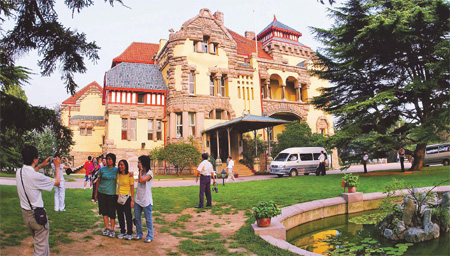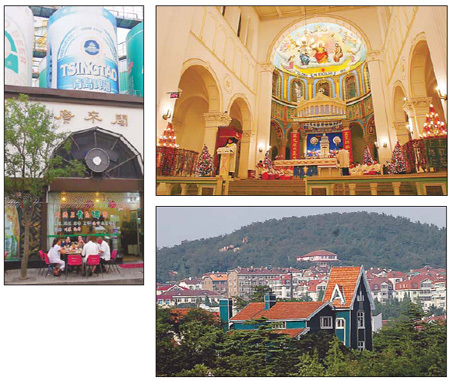Chinese city, German accent
Updated: 2011-09-06 15:25
By Li Yao (China Daily)
|
|||||||||||
 |
|
Many of Qingdao's tourist attractions were built when the city was still a German concession, and Teutonic influences are clearly apparent. [Provided to China Daily] |
 |
|
Clockwise from top: Tsingtao beer is as much a national icon as it is known and loved in Qingdao, where the residents love drinking it out of a plastic bag. St. Michael's Church still holds masses for Catholics living in this little paradise that fuses past and present, east and west. |
A German friend once stepped into a university cafe in Shanghai and confidently ordered a beer. "Tsing-tau, please," he said. The waitress courteously took the order and brought back, well, something he least expected - a pair of scissors. (In Chinese, the words for scissors and Tsingtao sound similar, especially for foreigners who have difficulty articulating the tones.)
Seeing his baffled face, I laughed out loud while correcting his order, but told him I appreciated his polite interest in speaking Mandarin and in tasting a popular Chinese brand. Perhaps there is more than just that. Many German visitors have a soft spot and a remote connection to Qingdao, where the Tsingtao Brewery created by German expatriates in 1903 continues to produce the world-renowned beer.
There is certainly truth in saying that Qingdao is a Chinese city with a German accent. The port city in the eastern part of Shandong province owes much of its charm and quaintness to its German texture, cobblestoned streets, red-tiled roofs, tree-lined avenues, and an out-of-place Bavarian appearance adorned by century-old European architecture.
From 1897 to 1914, Germany administered Qingdao as a concession and expanded its infrastructure and harbor. The occupiers built the railway station and a sewage system, piped in spring water from Laoshan Mountain and set up a brewery to quench the thirst of homesick German soldiers.
Much of the town's original planning has been kept intact, and the architectural heritage eventually evolved into the backbone of Qingdao's booming tourism, and a source of metropolitan pride.
Strolling at leisure is the best way to explore the town, watch the oceanfront sunrise, enjoy the languid beach promenades, and visit the old mansions in the German quarter.
Badaguan, meaning The Eight Great Passes, is the former German residential area. Now filled with cafs and boutiques, the spacious streets each lined with a particular type of tree, offer visitors a lush walk within sight of many European villas built during the German occupation.
Starting from the beautiful train station, people can visit many landmarks on foot, including a commanding catholic cathedral with twin spirals, St. Michael's Church. It remains an active place of worship and holds regular masses. The quiet and sunlit church is a popular site for people taking photographs for their wedding albums.
A few minutes southeast is the protestant church built in 1910 in German art-nouveau style. This elegant structure features a distinctive 39-meter clock tower, sandy yellow walls and red-tiled roof on the exterior.
To the east is Signal Hill, where flags were once raised to direct ships in the harbor. Climbers are rewarded with an idyllic view of the sparkling sea and the two churches nestled in the picturesque German quarter.
The most spectacular of German buildings is the former governor's residence, situated on the edge of the Signal Hill Park. The opulent mansion, built in 1903, uses colors, stones and bricks typical of an ancient Bavarian castle. It once housed the German commander, but is now the Qingdao Guest House.
No extravagance was spared in its majestic layout. It still houses a grand German piano made in 1876. The then German governor had felt he deserved the utmost in luxury, but when Kaiser Wilhelm II saw the excessive bill, the governor was immediately sacked. It is now a museum open to visitors.
The premier shopping street in the old town is Zhongshan Road with many time-honored shops. Since the 1990s, the area has been overshadowed by the emergence of other booming commercial districts, a fate shared by many liyuan, which feature square-shaped homes surrounding a courtyard.
In 2008, the local government re-opened Pichaiyuan, a li-yuan famous for its food and snacks, folk art and entertainment such as opera and cross-talk, as a tourist attraction.
Yet the jewel that crowns Qingdao's integration of Chinese wisdom and German influence is Tsingtao beer, China's proud export to more than 60 countries. With its magic ingredient of mineral water from Laoshan Mountain, it is famed for its delicate foam, crisp clarity and palatable flavor.
Following the tradition of Oktoberfest in Munich, a beer festival has been held in Qingdao every year in late August since 1991. Live performances, parades and seaside firework shows add to the excitement.
The locals seem to share their love for beer wherever they go. They have a famous habit of using plastic bags to take home their beer.
Maybe that is the beauty of this modern metropolis, a charming mix of East and West for those looking for relaxation, exotic diversions, atmospheric walks, sandy beaches, tasty seafood, binge drinking.